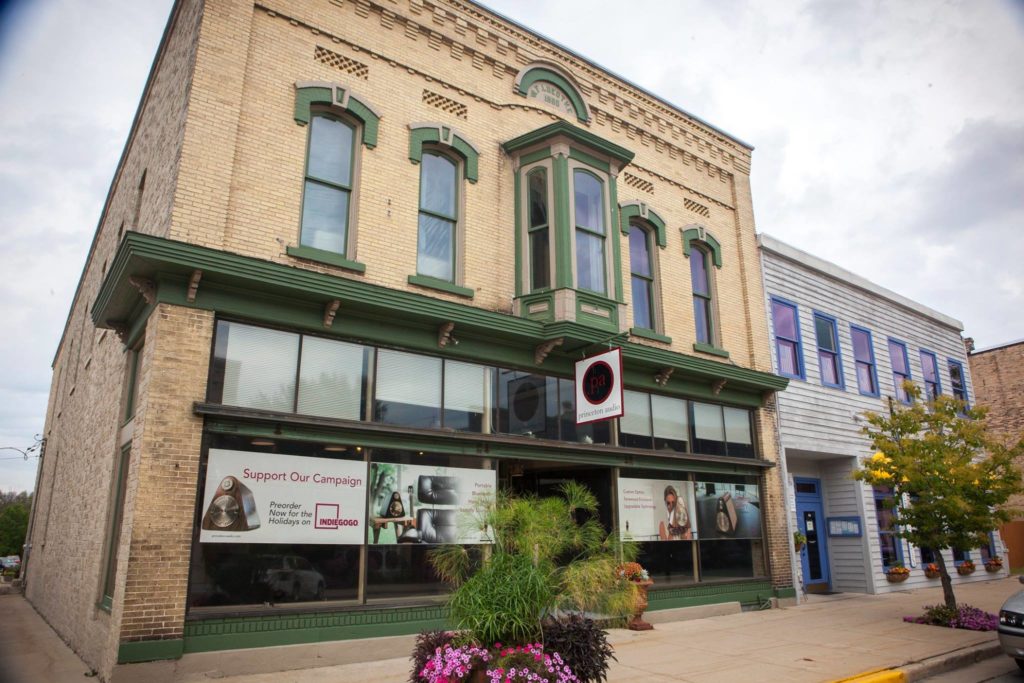Mike Pelland launched Princeton Audio to make handcrafted speakers and other audio system components, with a focus on local materials and melding old-world craftsmanship with new-world technology. He sells his first product, a unique triangular speaker constructed of musical-instrument-quality tonewoods, direct to audiophiles using the Shopify platform.
Mike had previously built an engineering consulting practice. For this venture, “I wanted to actually manufacture a product, and generate economic development, too,” Mike said. “The best way to do that is to make things and employ people.” Working backward from that idea, he decided on manufacturing wooden audio components. He holds more design patents that enhance the value of Princeton Audio, give it a unique competitive edge, and that will fuel future product development.
Lean Startup training a turning point
When Mike started Princeton Audio in June 2014 he found advice difficult to come by, especially related to his plans to blend e-commerce and craft manufacturing. He reached out to the Small Business Development Center at UW-Oshkosh for help. Director Colleen Merrill encouraged Mike to apply for a grant from the Emergent Technology Center, a joint effort of the UW-Oshkosh SBDC and Fond du Lac area business leaders and technology professionals. “Mike was in the first cohort in what we call the ‘Cannonball’, which is our business accelerator,” Colleen said. The program teaches the Lean Startup model of business development and facilitates introductions with potential mentors and investors.
“It was eye-opening,” Mike recalled. ”I came home the first day saying, ‘I can’t believe I’ve found a class that teaches me in the way I think.’” Colleen saw that the program helped Mike realize he had a great entrepreneurial mind. “It validated for him that he’s doing the right things.”
Next step: raising capital
Colleen worked with Mike on strategies and next steps, starting with understanding his financials. “If you’re going to be presenting to investors, you need to know your financials are in order,” she said. She helped Mike prepare forecasts of market potential and resources. Mike’s initial investors came from the Fond du Lac area (about 40 minutes east of Princeton), which he credits to connections made through the Lean Startup class and Colleen’s professional relationships.
For another capital raise in 2016, Mike turned to the crowdsourcing platform MicroVentures, a partner of IndieGoGo. Mike found crowdsourcing “a really interesting way to raise money and generate awareness at the same time, with the same investment.” He succeeded in raising over $80,000, which he plans to invest in options that will allow him to control the wood production, including a potential acquisition. “You’ve got to think big and start small—that’s where we’re at right now,” Mike said. Colleen added, “He has always been open to trying anything to move his business forward. His growth strategies are acquisitions that complement what he’s doing, that will lower his cost of goods, help him maintain quality control, produce at a higher rate.”
Accomplishments with the SBDC of UW-Oshkosh
- Training in Lean Startup curriculum
- Referrals to economic development resources
- Sounding board
Not easy marketing a high-end niche product
Marketing a specialized product has been the most difficult aspect of Mike’s startup, he said. Several marketing firms failed to produce the desired results, so he has shifted his strategy to building an in-house marketing team. He contracts with Hubspot for inbound marketing and uses social media marketing to drive sales. “We do a lot of analytics and targeting, emailing offers,” Mike said. YouTube videos and events on Facebook Live and Instagram Live that feature professional musicians who are enthusiastic brand advocates have been effective. “There’s no silver bullet. It’s a lot of work, but we’re starting to see results,” Mike said.
